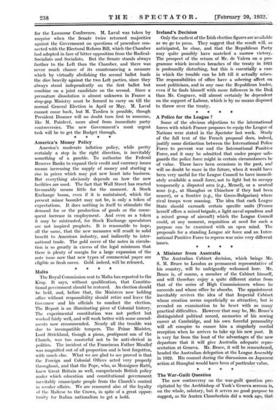A Police for the League ?
Some of the obvious objections to the international forces with which France proposes to equip the League of Nations were stated in the Spectator last week. Study of the full text of the French proposal does, indeed, justify some distinction between the International Police Force. to prevent war and the International Punitive Force, and it may be admitted that under proper safe• guards the police force might in certain circumstances be of value. There • have been occasions in the past, and will no doubt be more in the future, when it would have been very useful for the League Council to have immedi- ately available a small force, not to fight but to occupy temporarily a disputed area (e.g., Memel), or a neutral zone (e.g., at Shanghai or Chinchow if they had been nearer), or a frontier (e.g., the Greco-Bulgarian) where rival troops were massing. The idea that each League State should earmark certain specific units (France herself offers a mixed brigade, a light naval squadron and a mixed group of aircraft) which the League Council could, at any moment, requisition at need for such a purpose can be examined with an open mind. The proposals for a standing League air force and an Inter- national Punitive Force to repress war raise very different
issues. * * * *






































 Previous page
Previous page